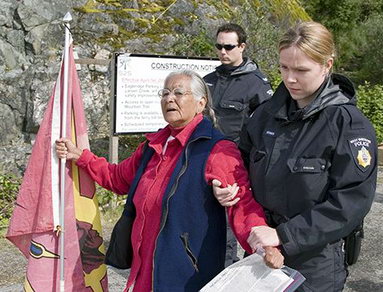
Kurt Vonnegut, Jr.
April 12, 2007 in Opinion
One of the most important voices of our time has been silenced with the passing of brilliant author Kurt Vonnegut, Jr. yesterday at the age of 84. So it goes.
posted by Cameron Ward
Mike Farrell: An American Hero
March 22, 2007 in Opinion
Mike Farrell dropped into town last night to promote his new autobiography, “Just Call Me Mike”. He may be better known to most as B.J. Hunnicutt from M.A.S.H., but Mike Farrell also deserves recognition as a tireless campaigner against the death penalty, against the Iraq war and against the destruction of the environment, to list but a few of his causes. These are some of the things he is against, but as those who turned out to hear him speak learned, he is for the human race.
Of this I am sure; if there were more Mike Farrells the world would be a much better place.
Buy his book.

posted by Cameron Ward
Activist jailed for ten months
March 5, 2007 in Opinion
Betty Krawczyk, 78, an environmental activist, author, political candidate and great-grandmother, was today sentenced to ten months in jail for her part in a peaceful political demonstration against Olympic-related road construction activities at Eagleridge Bluffs in West Vancouver last year.
The judge said this: “In mitigation, Mrs. Krawczyk’s protests were not violent. She has no criminal record other than for contempt. She is 78 years old. She has contributed to society by raising children and grandchildren. ”
Although the province of British Columbia is considered a democracy governed by the rule of law, it is also a jurisdiction that has come up with a creative way of punishing political dissidents. Rather than have people charged with breaking laws enacted by their duly elected representatives, the conventional way of dealing with public disorder, the government enlists the courts to have objectionable conduct characterized as contempt of court. It does so by encouraging the use of injunctions issued in sham civil proceedings. There is no statutory punishment for contempt of court resulting from the violation of a civil injunction; it is entirely up to a judge’s discretion as to how to punish such a “contempt of court”.
In a way, it’s a relief that Ms. Krawczyk was sentenced to merely spend some 300 days in jail; the judge could have imposed any punishment available under the English common law. Theoretically, the judge could have ordered that Betty be hanged at dawn.
All glibness aside, we may really be on to something here. As the 2010 Winter Olympic Games approach, the government should prevail on the BC Supreme Court to issue injunctions restraining anyone from panhandling, being homeless, standing too long in one place, dressing inappropriately, and the like. Those who violate such court orders can then be locked up in jail for months so as not to embarrass the government when the five ring circus comes to town.
And in an ironic note…
When a group of Ms. Krawczyk’s supporters congregated in the lobby of the courthouse to protest Betty’s treatment by the court for violating its interim injunction in the Kiewit case, they were dispersed only after the Chief Justice of the Supreme Court issued a mandatory injunction ordering “any individuals blocking access and disrupting business…to immediately vacate the premises.” Presumably, anyone who ever disobeys that order will be subject to a jail sentence as well.
Here are some other things that have been enjoined by BC Supreme Court injunctions recently:
Reading a J.K. Rowling “Harry Potter” book: On Saturday, July 9, 2005, BC Supreme Court Justice Gill issued an emergency interim and interlocutory injunction restraining anyone from “displaying or reading [Harry Potter and the Half-Blood Prince]…prior to 12:01 a.m. local time on July 16, 2005”.
Living in one’s own house: In Atco Lumber Ltd. v. Faust, an injunction designed to stop environmental protest was set aside after local residents complained that the geographical “no go zone” in the injunction precluded them from living in their own residences!
Exceeding the speed limit on the Upper Levels Highway near Horseshoe Bay: It is not widely known, but the court injunction that was issued to Peter Kiewit Sons Co., the same injunction that landed Harriet Nahanee and Betty Krawczyk in jail, also prohibits anyone from travelling on the highway in the construction zone other than in accordance with all applicable traffic laws.
Using Harriet Nahanee’s sentencing as a sentencing standard, anyone who violated these court edicts could also have faced 14 days in the Surrey PreTrial centre, confined to a cell with dozens of real offenders.
posted by Cameron Ward
Harriet Nahanee, 1935-2007
February 28, 2007 in News
Harriet Nahanee, an aboriginal elder and activist, died recently at the age of 71. She had just been released from the Surrey Pretrial Centre after serving a two week jail sentence for contempt of court for disobeying a court order made in a civil proceeding in which she was not named as a party.
Harriet was one of numerous local people who congregated at a Sea to Sky Highway construction site to demonstrate their displeasure with the government decision to blast an overland route through the sensitive Eagleridge Bluffs ecosystem, rather than build a much less obtrusive tunnel.
No one was charged with any criminal offence as a result of the protest demonstration. Rather, according to the anachronsitic British Columbia method of dealing with such matters, the corporate contractors, Peter Kiewit & Sons Ltd., commenced a sham* civil lawsuit and obtained an injunction restraining anyone from being in the vicinity of the work site. Harriet and others were accused of contempt of court when they ignored the order, and they were sanctioned accordingly, in a process described by another B.C. jurist as “officially induced abuse of process”, the use of civil proceedings for a collateral criminal objective.
Ironically, 71 year old Harriet Nahanee, a gentle soul, frail and in ill health, spent more time in prison than serial convicted sex offender Tom Ellison, a middle aged teacher who sexually exploited his students, or Doug Walls, who was convicted of defrauding a bank of about a million dollars. Both were given conditional sentences, meaning they will spend no time in jail.
Here is the excerpt from the judge’s reasons on sentencing, fully explaining why Harriet Nahanee was sent to jail for fourteen days:
“I will next deal with Harriet Nahanee. Ms. Nahanee did not admit her contempt. She took the position that the court did not have jurisdiction over her and left the court, after I gave reasons on the preliminary issue involving the Royal Proclamation. She did not attend the balance of her contempt hearing. Ms. Nahanee demonstrated no remorse and did not apologize for her conduct. She was one of the most prominent and public contemnors. She, of course, made no submissions regarding an appropriate sanction and I have no information regarding her circumstances. I will sentence her to 14 days.”
One could well ask;
Did Harriet Nahanee’s punishment fit the “crime” of attempting to speak out against the desecration of the environment?
By jailing her, a respected aboriginal elder, did the court do anything to enhance respect for the rule of law?

*In my opinion, the civil action is a sham because it was not commenced for any reason other than to procure the arrest and punishment of those persons whose conduct the corporate plaintiffs found objectionable. As at least one judge has said, a proceeding like this is nothing less than an abuse of the court’s process, a civil action commenced for the collateral purpose of imposing criminal sanctions.
posted by Cameron Ward
The Wood report: a missed opportunity
February 8, 2007 in Opinion
Josiah Wood, Q.C. has delivered his long-awaited report on the British Columbia municipal police complaints process. He essentially endorses the status quo, but recommends enhanced civilian oversight powers. Unfortunately, he recommends that police continue to investigate themselves, consigning this province’s system to the dark ages for the foreseeable future.
As Mr. Wood puts it, the investigative responsibility “should remain with the police until such time it becomes apparent that civilian oversight in this province cannot be successful unless responsibility for investigating police complaints is transferred to a completely independent investigative unit…I am not persuaded that point has yet been reached in this province.” (p. 51)
Well, Mr. Wood, with all due deference and respect, speaking as one who has been involved in a host of cases involving serious injury or death, I beg to differ. The police investigations in those cases have invariably been grossly deficient. In fact, my observations mirror the findings of Mr. Wood himself, arising from his file audit:
“Some investigations lacked investigative rigour. This revealed itself in the following ways: investigations going only far enough to justify the underlying police conduct…failing or refusing to interview other witnesses…failing to investigate in a timely fashion…failing to conduct a full investigation of potentially criminal allegations…” (p. C-35)
In the files I have handled, without exception, the police investigation of police-involved incidents of use of force resulting in serious injury or death have “lacked investigative rigour”. Here’s just one example: the year long VPD internal investigation into complaints that members of the VPD “crowd control unit” used excessive force when they clubbed demonstrators outside the Hyatt Hotel. The investigators failed to identify or interview a single police officer involved, though the entire incident was captured on videotape and complete records were available of who was on duty. The complainants and their backgrounds were extensively questioned and probed, but not one police officer was even named, let alone questioned!
For me, no amount of “civilian oversight” is a substitute for independent civilian investigation of serious matters, from the very outset. That is the way more enlightened jurisdictions deal with these cases; places like Ontario, Quebec and Great Britain. The government of Northern Ireland, in particular, has recognized that civilian investigation is imperative to restore and retain public confidence in policing.
Here’s my gratuitous advice to anyone who has the misfortune to be a victim of an apparent use of excessive force by police: if you have the resources, immediately hire a good independent private investigator to fully investigate the incident. If you lack the resources to do that, forget about the matter and move on with your life. Do not, under any circumstances, put your faith in the ability of police investigators to investigate their colleagues, for you will be facing years of frustration, anguish and disappointment.
To view the report, go to: http://www.pssg.gov.bc.ca/police_services/index.htm
Meanwhile, here’s the first few lines of the Vancouver Sun’s February 9 editorial:
Civilian probes would boost confidence in police
Published: Friday, February 09, 2007
The long-awaited report on British Columbia’s police complaints process offers many solid recommendations, but it should have gone a lot further than it did.







 Follow this site using RSS
Follow this site using RSS




